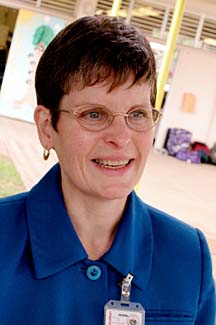
Hawaii’s deaf and blind
to lose 2 best friendsJeanne and Hugh Prickett
have brought much to state's
center for the deaf and blind
She has built the Hawaii Center for the Deaf & the Blind into one of the state's best public schools. He is a skilled sign language interpreter.
Jeanne and Hugh Prickett will leave Hawaii next week, dealing the blind and deaf community a double blow.
BY CRAIG T. KOJIMA / CKOJIMA@STARBULLETIN.COM
The number of teachers for visually impaired students doubled during Jeanne Prickett's seven years in Hawaii.
Jeanne Prickett has been recruited as superintendent of the Iowa School for the Deaf.
She has brought the Hawaii center "to an esteemed place in the Department of Education," said Ann Ito, director of KOKUA at the University of Hawaii.
Hugh Prickett also has been extremely valuable to the deaf community because there is a critical lack of sign interpreters, associates say. "We will miss his (Hugh Prickett's) skills, his talent and his heart," said Jane Knox, communication access specialist, Disability and Communication Access Board.
Jeanne Prickett said she would like to be closer to her family in Illinois, but she was not thinking of leaving until a headhunter called. She said the past seven years have been "the most extraordinary" of her career. "I saw such good things happening."
That was largely because of Prickett, said Scott O'Brien, chairman of the center's advisory board and father of a 19-year-old daughter who has attended the center for about 10 years.
He said Prickett "brought a tremendous sense of professionalism about solving problems over time that had seemed to overwhelm the system and seemed almost impossible to address."
The Department of Education had tried over the years to close the center, O'Brien said, noting the trend to include special-needs children in neighborhood schools.
Most visually impaired students are mainstreamed, but it is critical for deaf students to be in an environment where they can communicate with others, he said, explaining Prickett "was able to raise consciousness" about the right things to do.
Services for the blind also "were in a rather desperate state of affairs" because of a lack of experienced teachers in that area, and Prickett changed that, O'Brien said.
She obtained an agreement with the University of Northern Colorado to provide online course work and bring people here to train teachers for blind students.
The training program doubled teachers for visually impaired students in schools statewide, Prickett said, noting she has been working for three years to get a federal grant for a similar training program for teachers of deaf students.
She feels her major accomplishments have been to increase awareness of needs of blind and deaf students statewide and to make the program on campus "as strong as it could be."
The 85-year-old center, on a 5.1-acre site at 3440 Leahi Ave., has 87 deaf students, including 26 from the neighbor islands, living in campus dorms. The school provides American Sign Language learning.
"What I feel very positive about," Prickett said, "is the school climate has improved. We have a great teaching staff; they're doing a good job and they know they are, and parents and students know."
Kristine Pagano, who teaches American Sign Language at St. Francis School, said Prickett motivates deaf people and others "to reach for the stars."
She said she first met Prickett as Miss Deaf Hawaii Queen and, encouraged by the couple, earned a Bachelor of Arts at the University of Hawaii. She hopes to pursue a master's degree in the fall.
Prickett, who previously worked for the American Foundation for the Blind, "is a very prized professional for Hawaii to have been able to attract," said Ito, who is blind.
She said Prickett is one of only a handful of people in the country with double credentials in the education of blind and deaf children. (Prickett will earn $110,000 a year in her new job. As a DOE educational specialist, her salary falls in a $66,000-to-$93,000 range, the DOE said.)
Ito said Prickett has fought hard to meet needs of blind and deaf children and their families, such as fighting for approval for children living at the center to go home on weekends.
Larry Geller, an advocate for special-needs students, said Prickett was one of the first to adopt Felix consent decree guidelines for special-needs children. He met her as a caseworker for a multiply disabled student and was amazed that "years of complete neglect were mostly reversed in a single year under Dr. Prickett's guidance."
Prickett stresses communication access and meeting students' language needs in the classroom. "Our challenge is to bridge sign language with written language," she said.
Refined techniques, different approaches and technology such as WyndTell and Sidekick wireless text-messaging devices are helping to create the bridge and raise reading levels, she said.
